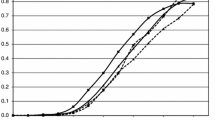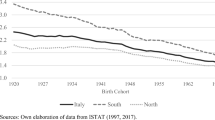Abstract
Transition rates estimated from the 1987–1988 and 1992–1994 waves of the National Survey of Families and Households imply that a U.S. adult will spend approximately one third of the years from ages 20 to 69 as a parent of a dependent child. I distinguish biological from social parenthood and provide separate estimates by gender and race. White women conform most to the conventional image of a biological parent residing with an own child, whereas African American women spend the most adult years as a parent. On average, white men spend fewer years as parents than African American men, but African American men spend more years as biological parents not residing with any children. Implications of these descriptive findings are discussed.
Similar content being viewed by others
References
Bumpass, L.L. and R.K. Raley. 1995. “Redefining Single-Parent Families: Cohabitation and Changing Family Reality.” Demography 32:97–109.
Bumpass, L.L., R.K. Raley, and J.A. Sweet. 1995. “The Changing Character of Stepfamilies: Implications of Cohabitation and Nonmarital Childbearing.” Demography 32:425–36.
Collins, P.H. 1991. Black Feminist Thought. New York: Routledge.
Eggebeen, D. and P. Uhlenberg. 1985. “Changes in the Organization of Men’s Lives: 1960–1980.” Family Relations 34:251–57.
Forste, R. and M. Tienda. 1996. “What’s Behind Racial and Ethnic Fertility Differentials?” Population and Development Review 22(Supplement): 109–33.
Fortes, M. 1969. Kinship and the Social Order. Chicago: Aldine Publishing Company.
Furstenberg, F.F., Jr. 1995. “Fathering in the Inner City: Paternal Participation and Public Policy.” Pp. 119–47 in Fatherhood: Contemporary Theory, Research, and Social Policy, edited by W. Marsiglio. Thousand Oaks, CA: Sage Publications.
Furstenberg, F.F., Jr. and A.J. Cherlin. 1991. Divided Families: What Happens to Children When Parents Part. Cambridge: Harvard University Press.
Garasky, S. and D.R. Meyer. 1996. “Reconsidering the Increase in Father-Only Families.” Demography 33:385–93.
Glick, P.C. 1977. “Updating the Life Cycle of the Family.” Journal of Marriage and the Family 39:5–13.
Goldscheider, F.K. and G. Kaufman. 1996. “Fertility and Commitment: Bringing Men Back In.” Population and Development Review 22(Supplement):87–99.
Hogan, D.P. 1987. “Demographic Trends in Human Fertility and Parenting Across the Life Span.” Pp. 315–49 in Parenting Across the Life Span: Biosocial Dimensions, edited by J.B. Lancaster, J. Altmann, A.S. Rossi, and L.R. Sherwood. New York: Aldine de Gruyter.
Hogan, D.P. and N.M. Astone. 1986. “The Transition to Adulthood.” Annual Review of Sociology 12:109–30.
Ishii-Kuntz, M. and K. Seccombe. 1989. “The Impact of Children Upon Social Support Networks Throughout the Life Course.” Journal of Marriage and the Family 51:777–90.
Kiernan, K. 1989. “The Departure of Children.” Pp. 120–44 in Later Phases of the Family Cycle, edited by E. Grebenik, C. Hohn, and R. Mackensen. Oxford: Clarendon Press.
McLanahan, S. and J. Adams. 1987. “Parenthood and Psychologi cal Well-being.” Annual Review of Sociology 13:237–57.
Minton, C. and K. Pasley. 1996. “Fathers’ Parenting Role Identity and Father Involvement: A Comparison of Nondivorced and Divorced, Nonresident Fathers.” Journal of Family Issues 17(1):26–45.
Morgan, S.P. 1996. “Characteristic Features of Modern American Fertility.” Population and Development Review 22(Supplement): 19–63.
Morgan, S.P. and R. Chen. 1992. “Predicting Childlessness for Recent Cohorts of American Women.” International Journal of Forecasting 8:477–93.
Morgan, S.P. and R.R. Rindfuss. 1999. “Reexamining the Link of Early Childbearing to Marriage and to Subsequent Fertility.” Demography 36:59–75.
Preston, S.H. and P. Heuvaline. 1996. “Elements of Demographic Accounting.” Unpublished manuscript, Population Studies Center, University of Pennsylvania.
Rossi, A.S. 1984. “Gender and Parenthood.” American Sociological Review 49: 1–19.
Ruddick, S. 1989. Maternal Thinking: Toward a Politics of Peace. New York: Ballantine Books.
Stack, C.B. All Our Kin. New York: Harper & Row.
Sweet, J., L. Bumpass, and V. Call. 1988. “The Design and Content of the National Survey of Families and Households.” NSFH Working Paper No. I. Center for Demography and Ecology, University of Wisconsin-Madison.
Townsend, N. 1994. “An Anthropological Approach to the Concept of Fertility: Parenthood, Fertility, and Social Reproduction.” Draft paper prepared for the Brown University Conference on Anthropological Demography, November 3–5.
U.S. Bureau of the Census. 1997a. “Families by Presence of Own Children Under 19: 1950 to Present.” Document on-line at http://www.census.gov/population/socdemo/hh-farn/95his08.txl.
U.S. Bureau of the Census. 1997b. “Resident Population of the United States: Estimates by Age and Sex.” Document on-line at http:// www.census.gov/population/estimates/nation/intfile2-1.txt.
Watkins, S.C., J.A. Menken, and J. Bongaarts. 1987. “Demographic Foundations of Family Change.” American Sociological Review 52:346–58.
Wojtkiewicz, R.A., S.S. McLanahan, and I. Garfinkel. 1990. “The Growth of Families Headed by Women: 1950–1980.” Demography 27: 19–30.
Author information
Authors and Affiliations
Corresponding author
Additional information
This research was supported by the Dolores Zohrab Liebmann Foundation and the Population Studies Center at the University of Pennsylvania. I thank Frank Furstenberg, Jr., S. Philip Morgan, Samuel Preston, and Greg Urban for their comments.
Rights and permissions
About this article
Cite this article
King, R.B. Time spent in parenthood status among adults in the united states. Demography 36, 377–385 (1999). https://doi.org/10.2307/2648060
Issue Date:
DOI: https://doi.org/10.2307/2648060




